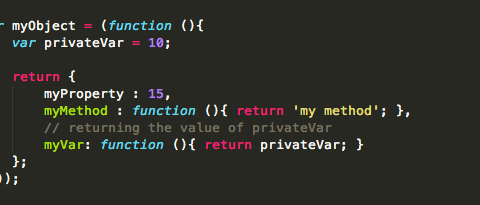We all know that Javascript does not support (property or method) privacy when you write Object Oriented code. In this post, i will explain how to create private (properties and methods) in Javascript.
Lets start now to do an experiment: lets create a normal object with a property and method, and try to access them to see what we get.
Here is how to create a simple object:
// Creating an Object:
var myObject = {};
// Now setting a method and a property
myObjcet.myProperty = 10;
myObject.myMethod = function (){return 'My Method';};
Now, lets try to access them. I will use my Console on the browser:
console.log(myObject.myProperty); // This will return 10 console.log(myObject.myMethod()); // This will return 'My Method' string
We can modify our method and property by doing this:
myObject.myProperty = 15;
myObject.myMethod = function (){return 'something else';};
This will be a problem, because we need to access our method and property.. But we don’t want them to be changed or modified.
Let’s try to write this in a different way to make them private.
var myObject = (function (){
// this is a private property. Cannot be accessed.
var privateVar = 10;
return {
myProperty = 15,
myMethod = function (){return 'my public method';}
};
}());
Now, we can access “myProperty” and “my Method” as the following code:
console.log(myObject.myProperty); // 15 console.log(myObject.myMethod()); // "my public method"
But we can’t access the “privateVar” property. It can be only accessed within the Object scope.
Let’s try to get its value. We will need to write another method to do that:
//Same as previous declaration:
var myObject = (function (){
// this is a private property. Cannot be accessed.
var privateVar = 10;
return {
myProperty : 15,
myMethod : function (){return 'my public method';},
// Here we can get the private value
myVar : function (){return privateVar;}
};
}());
Now, if we tried to access all that from our Console, we will get :
console.log(myObject.privateVar); // undefined console.log(myObject.myVar); // 10
There is another way to do this, but it’s not supported by all browsers (supported by Firefox, Chrome, Safari, IE9+ and somehow supported by IE8)
By using:





Thank for sharing, i love this article.
JS is my favorite thing when doing an interactive web app.
I’m a new developer. Just want to ask:
for the 1st example:
var myObject = (function (){// this is a private property. Cannot be accessed.
var privateVar = 10;
return {
myProperty = 15,
myMethod = function (){return 'my public method';}
};
}());
You use “=” to define your property and method;
For the 2nd example:
//Same as previous declaration:var myObject = (function (){
// this is a private property. Cannot be accessed.
var privateVar = 10;
return {
myProperty : 15,
myMethod : function (){return 'my public method';},
// Here we can get the private value
myVar : function (){return privateVar;}
};
}());
you use “:” to define them. Will they both work?